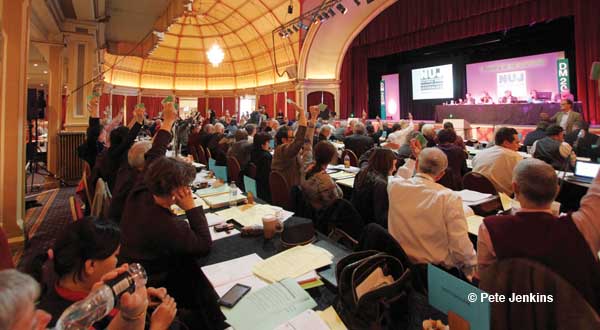All change for journalists
WORKERS, MAY 2014 ISSUE
JOURNALISTS assembling in Eastbourne before Easter for their biennial delegate meeting started the afternoon before with a conference on the future of journalism. It was an apt beginning, because their industry is in the middle of intense change, with no end in sight.

Eastbourne, April 2014. Journalists voting at the NUJ’s Delegate Meeting.
Photo: Pete Jenkins/www.petejenkins.co.uk
The National Union of Journalists is a small union, with not much more than 30,000 members paying full subscriptions. But having seen what has happened to the print unions, which were swallowed by Unite and are now a shadow of their former selves, NUJ members are increasingly united in their desire to stay as an independent journalists’ union.
Of course size matters, and so do economies of scale in running a union. In addition, large-scale redundancies in local newspapers together with contractions at the BBC and national newspapers are eroding the union’s traditional membership base.
Staff numbers at the Nottingham Post, for example, have been reduced to 48 from a high of 249. Cuts like that mean, as one member from the PR sector explained, that many press releases are appearing in newspapers with no subediting or checking, and not one word altered.
Another unwelcome development is the intensification of work for those journalists still in full-time employment. That, perhaps, was reflected in the fact that half the branches in the union were not represented at the meeting. And many of the delegates were retired, freelancers or working outside the traditional chapels (office branches) where the core strength of the union lies.
How else to explain that there had to be a card vote on a proposal from the union’s 60+ body to change the rules to give retired members the right to attend and vote at meetings of their former chapel(s)? Chapel representatives at the meeting were aghast. The motion was eventually defeated. ■